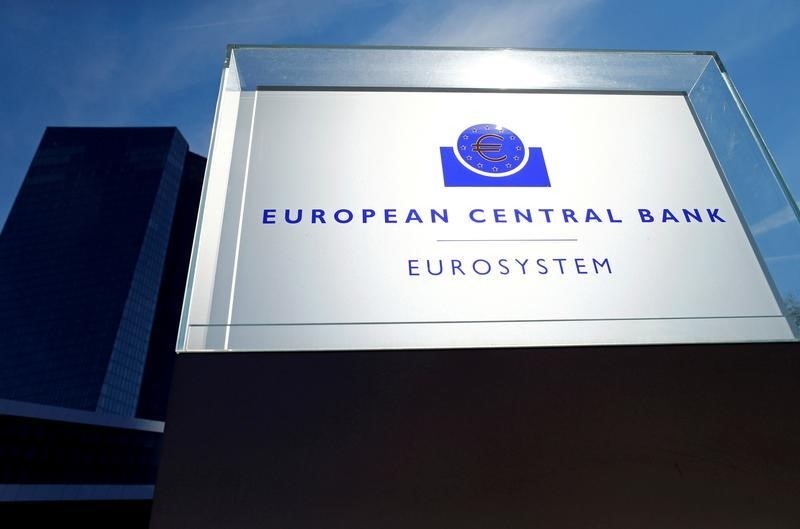By Dhara Ranasinghe
LONDON (Reuters) - Foreign holdings of German government bonds have fallen to their lowest since before the financial crisis in 2008, data suggests, a potential headache for the European Central Bank which buys the bulk of assets for its stimulus scheme from among the debt.
Based on data from the ECB, Eurostat and the International Monetary Fund, Commerzbank (DE:CBKG) estimates net selling of German debt by overseas investors dried up at the end of 2016.
Given signs the ECB is struggling to meet its target of German bond purchases for quantitative easing due to a scarcity of eligible debt, indications a key source for those purchases is thinning out could bolster the case for the 2.3 trillion euro($2.6 trillion) scheme to be scaled back.
The ECB is tipped to take a tentative step toward "tapering" at its June meeting. But with QE scheduled to run until year-end with any tapering to follow, scarcity of debt from euro zone benchmark issuer Germany could deepen.
"During the first part of QE, the ECB got most of its paper from overseas investors," said Michael Leister, head of rates strategy at Commerzbank in Frankfurt.
"When you look at the data now, you see that the selling from overseas has come to a halt. If you take this together with the broader scarcity issues in the market, it tells us that the supply and demand imbalance in Bunds is going to extend."
According to Commerzbank, foreign holdings of German debt have fallen by more than 200 billion euros since the start of QE in 2015 and are lower than before the global crisis in 2008.
Data from syndicated bond sales this year shows demand for euro zone debt in general from Asian central banks has slowed, partly reflecting lower currency reserves.
Bond investor flow data meanwhile suggests foreigners provided the bulk of the roughly 35 billion euros of bonds purchased by Germany's Bundesbank, which acts on behalf of the ECB, in the fourth quarter of 2016.
While slower selling of German debt by foreign investors has been offset by sales from foreign but euro zone-based investors, analysts question how long that can be sustained.
That's because long-term holders of government bonds in the euro area, such as pension funds or insurers, are mandated to hold a quantity of top-quality debt to match long-term liabilities, competing with the ECB for government paper.
"Certainly, the large chunk of sales for the ECB on a net basis has been from foreign investors," said Rabobank bond strategist Lyn Graham-Taylor.
"And if you think about other holders of government bonds that need them for duration, for instance pension funds, you can see why they would be reluctant to sell."
He said data from the Dutch National Bank also showed foreign investors are a prime source for the asset purchase scheme in the Netherlands.
Since December 2014, the foreign-owned share of Dutch paper has declined to around 50 percent from just over 60 percent -- selling matched by increased holdings of Dutch bonds by the central bank, reflecting QE purchases.
SQUEEZED
In Germany, Europe's biggest economy, debt issuance has also been capped as the government takes advantage of a budget surplus to borrow less on capital markets.
With supply low but demand high, a scarcity of German debt has squeezed short-term funding markets where the bonds are used as collateral, while raising concerns about the depth of liquidity in one of the world's biggest bond markets.
Recent policy tweaks allow the ECB more flexibility to conduct asset purchases, for instance buying bonds below the minus 0.4 percent deposit rate.
ECB Executive Board member Benoit Coeure told Reuters last week that while there is a scarcity, there will be no shortage of bonds to fulfill QE.
Alexandra Beust, spokeswoman for Germany's debt management office, said: "We are monitoring the market moves but we are not concerned about it."
The debt agency would not issue more bonds to address the scarcity issue since issuance is determined by Germany's financing needs.
According to the debt office, in 2016 America and Africa were net sellers of German government bonds while all other regions were net buyers.
One side effect of all this is that the Bundesbank will have to pay a higher premium to entice investors to part with their bonds.
The Bundesbank posted its smallest profit in more than a decade in 2016 after setting aside money against potential losses on the bonds it buys under the scheme.
Further signs of scarcity suggest Bund yields are likely to be pinned lower even as the ECB moves closer to scaling back QE -- a development that would usually imply higher yields.
"Bunds will remain structurally supported, as the demand windfall has been captured and price concessions will have to rise incrementally to entice other holders to sell," said Commerzbank's Leister.
